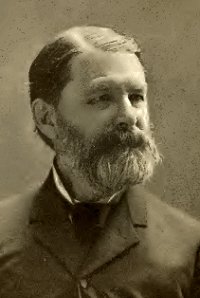Low in the grave He lay,
Jesus, my Saviour;
Waiting the coming day,
Jesus, my Lord.
Up from the grave He arose,
With a mighty triumph o’er His foes!
He arose a victor from the dark domain
And He lives forever with His saints to reign;
He arose! He arose!
Hallelujah! Christ arose!
Vainly they watch His bed,
Jesus, my Saviour;
Vainly they seal the dead,
Jesus, my Lord.
Death cannot keep his prey,
Jesus, my Saviour;
He tore the bars away,
Jesus, my Lord.
 When Pastor Robert Lowry went home exhausted on a Sunday night, he sometimes relaxed by writing hymns. Ira Sankey said of him, “Dr. Lowry will continue to preach the Gospel in his hymns long after his sermons have been forgotten. Many of his hymns were written after the Sunday evening service, when his body was weary but his mind refused to rest.” This hymn was written on a Sunday evening during the Easter season in 1874. While meditating on Luke 24: 6-8, Robert Lowry was impressed by the words of the angel at Christ’s grave: “Why seek ye the living among the dead? He is not here, but is risen!” Words and music revolving around this text came to Lowry’s mind, and he sat down at his organ and completed this beloved Easter hymn.
When Pastor Robert Lowry went home exhausted on a Sunday night, he sometimes relaxed by writing hymns. Ira Sankey said of him, “Dr. Lowry will continue to preach the Gospel in his hymns long after his sermons have been forgotten. Many of his hymns were written after the Sunday evening service, when his body was weary but his mind refused to rest.” This hymn was written on a Sunday evening during the Easter season in 1874. While meditating on Luke 24: 6-8, Robert Lowry was impressed by the words of the angel at Christ’s grave: “Why seek ye the living among the dead? He is not here, but is risen!” Words and music revolving around this text came to Lowry’s mind, and he sat down at his organ and completed this beloved Easter hymn.
Robert Lowry was born in Pennsylvania in 1826 and lived until 1899. He came to Christ at the age of seventeen, and later studied at the University of Lewisburg (now called Bucknell University) in that state. He pastored churches in Pennsylvania, New York and New Jersey, taught at Bucknell University and at one time served as its chancellor. He was known for his Biblical scholarship and his strong preaching. He once said, “Music with me has been a side issue. I would rather preach a Gospel sermon to an appreciative audience than write a hymn. I have always looked upon myself as a preacher and felt a sort of depreciation when I began to be known more as a composer.”
“Why seek ye the living among the dead? Share on XAs prophetically stated by Ira Sankey in the first paragraph above, however, it is Robert Lowry’s hymns for which we now remember him in 2016, and by which we are most blessed!
WORDS AND MUSIC: ROBERT LOWRY
S.A. SONG BOOK, 1987 EDITION, #148 SECTION: THE LORD JESUS CHRIST – HIS RESURRECTION AND ASCENSION
REFERENCE: MORGAN, ROBERT J., THEN SINGS MY SOUL, BOOK 2






